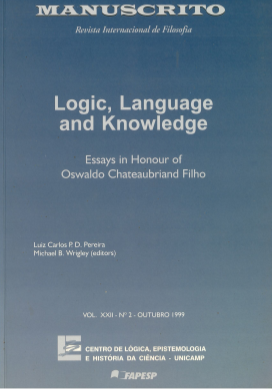Resumo
Au Prof. Oswaldo Chateaubriand, pour ses 60 ans
We discuss the validity the famous Barcan's formula, according to which one can deduce, among many things, the existence of Wittgenstein's child. We point out that existential quantifier is interpreted as a disjunction, following the classical view, the validity of the formula is not questionable. Of course one may doubt that the classical existential quantifier offers a correct view of everyday life existence, but then what does he have to say about existence?
Referências
Barcan Marcus, R. (1946). A functional calculus of first order based on strict implication, Journal of Symbolic Logic, 11, 1-16.
Carnap, R. (1932). Überwindung der Metaphysik durch logische Analyse der Sprache, Erkenntnis, 2, 219-241.
Dugundji, J. (1940). Note on a property of matrices for Lewis and Langford's calculi of propositions, Journal of Symbolic Logic, 5, 150-151.
Fraisse, R. (1982). La zérologie, une recherche aux frontières de la logique et de l'art; applications à la logique des relations de base vide, International Logic Review, 26, 67-79.
Kant, E. (1763). Der einzig mögliche Bewisgrund zu einer Demonstration des Daseins Gottes.
Kripke, S. (1963). Semantical considerations on modal logic, Acta Philosophica Fennica, 16, 83-94.
Lesniewski, S. (1927). O podstawach matematyki, Przeglad Filozoficzny 30, 164-206.
Lukasiewicz, J. (1920). O logice trójwartosciowej, Ruch Filozoficzny, 5, 170-171.
Lukasiewicz, J. (1953). A system of modal logic, Journal of Computing Systems, 1, 111-149.
Monk, R. (1990). Wittgenstein: the duty of genius (London, Vintage).
De La Tour, R. (1984). Le Baron de Chambourcy: sa vie et son oeuvre (Paris, Éditions de la Bourisse).
Williamson, T. (1998). "Bare Possibilia", Erkenntnis, 48, 257-273.

Este trabalho está licenciado sob uma licença Creative Commons Attribution 4.0 International License.
Copyright (c) 1999 Manuscrito: Revista Internacional de Filosofia


